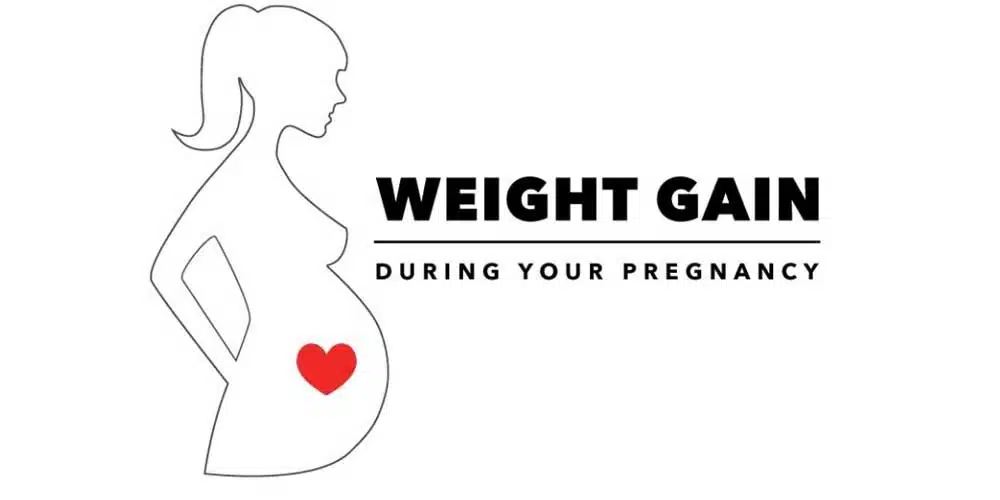Weight gain during pregnancy is a natural occurrence. Pregnant woman needs more calories but it does not mean “Eating for two”.The amount of calories should be calculating with guidance of a physician. Apparently indulgence is not neither in the interest of the mother nor in the interest of the child.
Eat for two is a wrong advice. A woman with normal weight before pregnancy should consume only 300 more calories during a day.It is better to fill this amount of calories by consuming fruits and nuts or healthy foods, not fried foods or soft drinks or overeating carbohydrates.
What is the normal amount of weight gain during pregnancy?
Weight gain in pregnancy depends on your weight before pregnancy. In general, you should gain about 2 to 4 pounds (900 to 1800 grams) during the first 3 months that you’re pregnant and 1 pound (450 grams) a week during the rest of your pregnancy. A woman who was average weight before getting pregnant should gain 25 to 35 pounds after becoming pregnant. Underweight women are allowed to gain 28 to 40 pounds. Overweight women may need to gain only 15 to 25 pounds during pregnancy. For twins women should gain 35 to 45 pounds. In the first trimester, morning sickness may causes you lose weight. This weight lost should be compensated in following months. Gaining too much or too little weight can lead to various problems during pregnancy and after you give birth, which is why going at a steady pace is best. In most cases, there’s a lot you can do to keep your pregnancy weight gain under control.
The simplest: Go for a walk!
In the benefits of walking much has been said so far and it continues. Walking is a safe, free activity you can do without equipment-except for a pair of sneakers.

It boosts your general health, reduces pain, may lower your risk of developing gestational diabetes, preeclampsia, and even helps to deliver your baby naturally and avoid C-section.
While heavy sports might be forbidden during pregnancy, walking is very low risk activity that you can bring in your daily routine.
Gain the right amount of weight especially matters if you’re expecting twins. Twins usually born before the due date so a higher birth weight is important for their health. Plus, mother’s weight directly affects baby’s weights.
A-mother-to-be with twins needs 3000-3500 calories a day.
Natural weight gain during pregnancy starts from 11 pounds (for overweight women) to 40 pounds (for underweight mothers). Less and more than these numbers are red flags of issue. Talk to your doctor.
Excess weight gain during pregnancy
Weight gain more than standard numbers in pregnancy increases the risk of unnatural big newborn. It also increases the risk of pregnancy diabetes, high blood pressure, late or preterm delivery. Excess weight gain may also cause obesity after giving birth. So beware of your weight and think of the ways which keep your weight in healthy range.
How to know if we are overweight
Weight measures by an index called BMI (Body Mass Index). BMI is a measure of body fat based on height and weight that applies to adults. It’s not accurate for athletes (who weigh more because of muscles). For athletes, weight measured by body fat percent, not BMI. It works with formula based on weight and the square of height. Weight divided into square of height. The obtained number tells you in which category you are. BMI divided into 5 categories: Underweight Below 18.5 Normal 18.5 – 24.9 Overweight 25.0 – 29.9 Obese 30-35 Morbidly obese 35 and above Newborn may weigh between 6 to 8 pounds. Only a limited part of weight gain during pregnancy is because of fetus. Other things are: Placenta: 2-3 pounds Amniotic fluid: 2-3 pounds Breast tissue: 2-3 pounds Blood supply: 4 pounds Stored fat for delivery and breastfeeding: 5-9 pounds Larger uterus: 2-5 pounds
How to gain the right amount of weight while pregnant?
If you should gain weight or your doctor recommends so, try these tips: Instead of a routine with three meals a day, Eat five to six small meals every day. Prepare small, healthy and quick snacks. take them with yourself. Nuts, cheese and crackers, fruit yogurt, ice cream and dried fruit are good options. Don’t forget peanut butter! Peanut butter is a healthy, useful way for weight gain. Spread it on toast, slices of fruits or crackers. One tablespoon of creamy peanut butter gives you about 100 calories and 7 grams of protein. Help yourself! Add nonfat powdered milk to mashed potatoes, scrambled eggs, and hot cereal. Add a dessert to your meal. It can be a little chocolate or a full plate of tiramisu. Desserts help you weight gain. But be careful about your sugar intake
Weight loss in pregnancy
Weight loss during pregnancy is not recommended. If you are overweight and intend to be a parent, recommended to lose your weight before getting pregnant. However, if it’s too necessary try to lose weight with light activities like walking or swimming. Exercise 30 minutes daily. Create a plan for gradual weight loss during pregnancy. Don’t rush. The first way you can lose excess weight is by reducing your daily calorie intake. Eating more calories than you burn off is the most common cause of weight gain.















